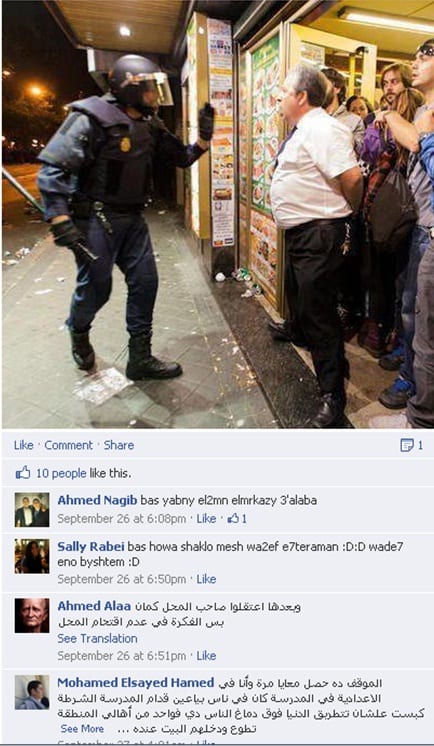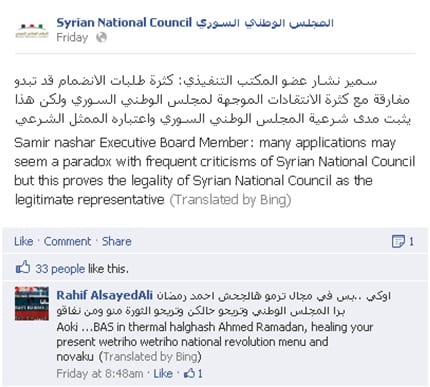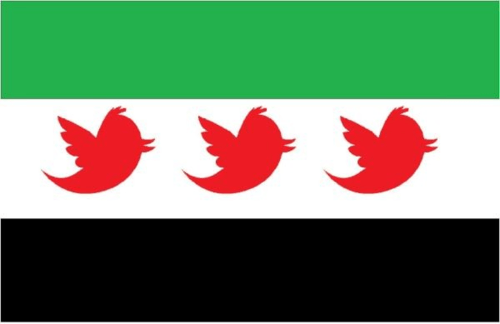On Tuesday October 2nd, I had the chance to attend an event called “Groundtruth: New Media, Technology, and the Syria Crisis” at the United States Institute of Peace (USIP) which consisted of three panels speaking about the presence and usefulness of social media in Syria (see more about the event here). This event was based on a report of the same title which you can read here. The first panel, Activists and the Regime, demonstrated that social media is being used in five major ways: as a fundraising tool, a method of negotiation, a way of accepting opinions, organizing and maturing civil society, and as a forum for encouraging thought and debate.
It is this last point that I found most fascinating. Rafif Jouejati (@RafifJ) from the Free Syria Foundation noted that Facebook comments were the most likely place to find debate among Syrians and that this tool was teaching the Syrian people how to debate and have respect for others’ ideas while maintaining their own opinions. Looking at the effects of social media in other countries that are part of the Arab Spring, I had never come across the point of social media being used as a tool to teach debate. Sure, there was preference revelation and the building of civil society, but the point about teaching debate on social media and the importance of Facebook comments was new to me. It is a fascinating perspective because this is the first time that these users have been able to engage in something that we take for granted. The anonymity of the Internet and the idea of not being face-to-face with a person or the possibility of being overheard by secret police or other government agents allows free-flowing discussion and this is where the actual revolution is taking place.

Later in the panel, the idea that not all analyzers, sympathizers, or potential aids understand Arabic was raised. This led me to think of the missing feedback loop between the debates and those who need to understand what is happening such as Department of State employees, researchers and analysts, news agencies and reporters, and aid organizations from outside the country.
As researchers of social media know, one of the greatest ways that social media can be used as a tool is in what is called the “boomerang effect.” This idea says that social media can lead to rapid response, whether by political pressure or monetary and non-monetary aid, by other countries that support the cause. However, because those that have the power to help do not often look to Facebook comments, most do not know about this debate. In speaking with fellow blogger and IPDGC fellow Mary Jeffers, during a break between sessions, she brought up another point in that there were some excellent ideas in those comments that she would like to share with colleagues, but couldn’t because of their limited knowledge of Arabic and the fact that no one has time to send everything through Google Translate.
Even if someone had this time, a non-Arabic speaker would probably not be able to understand the English that comes out of the translations because, as we all know, Google Translate is not perfect and one has to know the structure of the language to really understand the English results. Facebook’s “See Translation” link does not always work either as it just links to translation by Bing. In addition, Arabic posters write in two different forms: traditional Arabic script and the transliterated form.

Google Translate does not even read transliterated form and, as in English, online commenting is often abbreviated or written differently which is why a person would need to read these comments to be successful. Below is an example of what happens when I clicked on the “See Translation” button provided by Facebook.
As you can see, the translation of the original post makes sense, but the comment does not at all. This is the issue. There is inconsistency in the translation when and if it’s even available.
These comments and debates give us better clues as to what is going on in the crisis and help us to gain credibility when reporting stories which is a large problem in the Syrian situation. Information that comes from on-the-ground sources is useful and the debates provide the honest feedback that we need to truly understand the problems and to mobilize people and resources to give aid where it is needed. The problem here is a communication gap. There are no easy solutions to solving this problem. Clearly, we cannot expect everyone who analyzes and researches the crisis or is in the position to give aid to speak Arabic. We also cannot expect the Activists to write in English. What we need to do is have designated people at each agency involved to read through these comments on a regular basis and report the findings to people in power. We are missing some of the most crucial information and that needs to be changed.
This can also help news agencies because, as stated in the second and third panels, the Syria crisis has been a long conflict and the stories are no longer getting the attention they deserve. With information from the debates that are occurring on social media, there is something new to report and a new way to get the audience involved and interested in what is happening. As we know, there are two different messages going out: the ones between Arabic speakers and the ones in English directed towards non-Arabic speakers. We need to see the complete Arabic side of this to get the truth, maintain credibility, keep people interested, and find out the best ways to help.
Reading, understanding, and reporting on these debates will not be an easy task. However, this information gives us the insight we are missing and will help us to further understand just how civil society is being built and what people are thinking in this complex, multi-sided crisis.
With social media as a largely-used tool in the conflict, we cannot ignore these comments and debates. We have come very far in incorporating social media into research and reporting, but we still have a ways to go if we want to use this tool to its fullest extent.



âNew Media, Syria, and the Feedback Loop « Take Fiveâ
was in fact entertaining and helpful! Within the
present day world thatâs very hard to execute.
Regards, Amelie